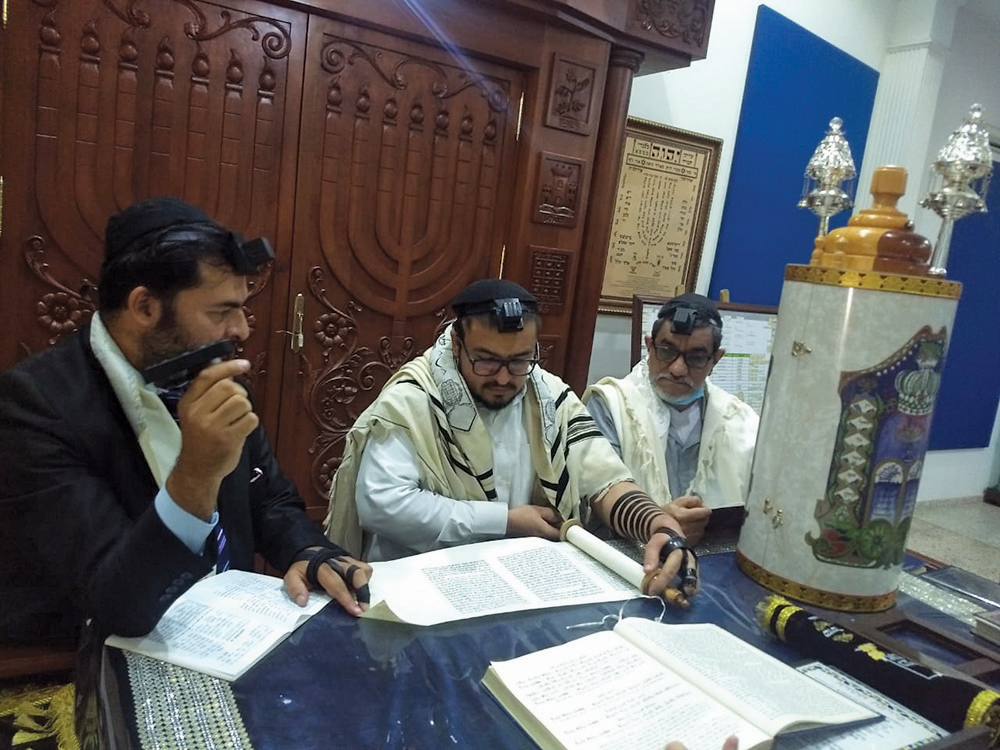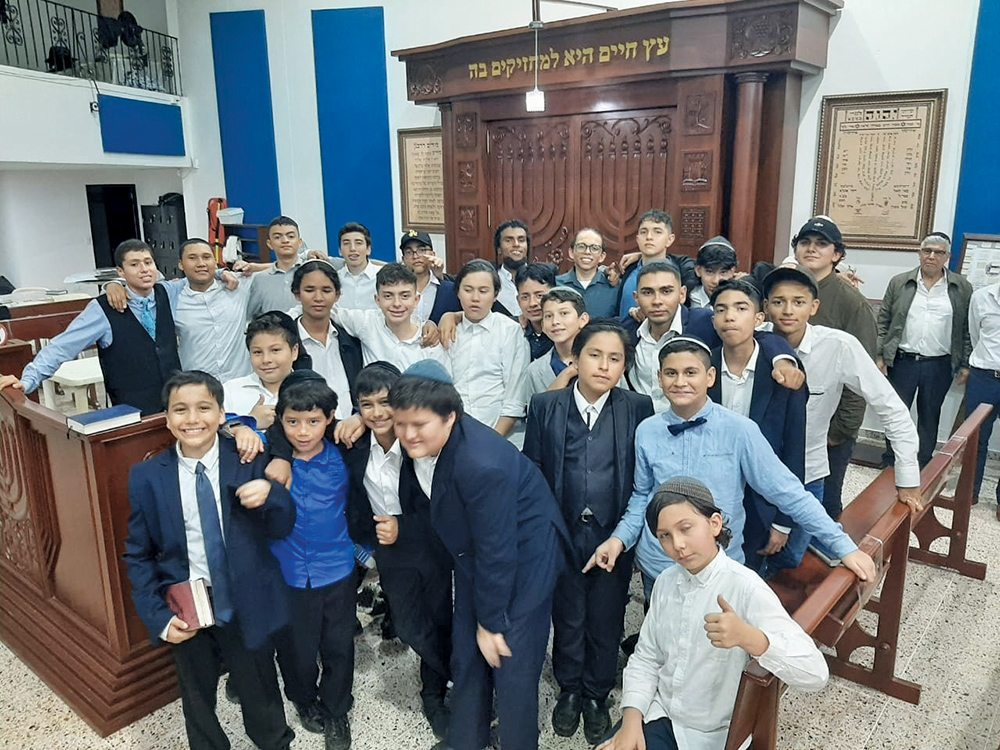
Alex Salazar and his younger brother Andres closely resemble each other, and work in tandem to aid Colombian Jews—but each operates from different continents. On Zoom, Alex, in Fair Lawn, and Andres, in Bogota, discuss their families’ and their communities’ journeys to Judaism. Colombia’s Jews number approximately 4,000. The country has seen a sharp rise in Orthodox conversions, in Aliyah, and the strengthening of religious institutions.
In collaboration with their mentor, Rabbi David Algaze, who heads Havurat Yisrael Synagogue in Forest Hills, the brothers created El Portal de Judaismo Foundation, which provides multiple areas of support to the Colombian communities. The story precedes this collaboration, though.
The Salazar brothers, who were born and raised in Cali, came to the US in 1999. Andres and his mother arrived five months before Alex. They settled in North Bergen, where Alex played piano in a Pentecostal church, studied theology, and was “close to a monk.” About nine years ago, along with his friend Rene Carrion, Alex started to question church doctrines. The two men, who by that time were married to Grace and Marleny (now Rivka) respectively, began to explore Judaism. Both families, including the Salazars’ daughter Diana, briefly joined a messianic church, but their quest for Jewish knowledge increasingly distanced them from Christianity.

The Carrions and Salazars originally married as Pentecostalists and then again as messianic Jews; after that congregation’s leader disclosed that Orthodox Jews would not accept their conversions and weddings, they accelerated their learning as B’nai Noach (keeping the seven Noahide laws) and registered with both AlephBeta.org (Rabbi David Fohrman) and watched Rabbi Tovia Singer’s YouTube channel. A mutual friend connected them with Rabbi Algaze, and during COVID, they and their friends watched and discussed Rabbi Algaze’s classes (https://www.youtube.com/channel/UCt78scjbTyB_PGRinCsqgjA).
Within two years, both families decided to pursue Orthodox conversion. They walked on Shabbat to a Conservative congregation one mile from their homes for a year but sought out a new environment.
Joining a Kehilla and Inching Towards Gerut
The Carrions and the Salazars recognized that they needed a strong community. They shared a rented house in Fair Lawn, near Congregation Ahavat Achim, which was warm and accepting. For Jewish holidays, they rented an Airbnb near Rabbi Algaze’s synagogue, and progressed there through the conversion process. After their conversion, Diana Salazar studied at a seminary in Israel. When the lease on the shared house expired, the Salazars and Carrions moved across Fair Lawn and joined Congregation Shomrei Torah. Sadly, Rene Carrion, Z”L, passed shortly thereafter.
Post-conversion, the Salazars and Grace Carrion still visit Rabbi Algaze, but since Andres returned to Colombia, that relationship has centered on their mutual desire to assist Colombian converts, who direly need Jewish resources. Andres’s conversion was far from the first in Colombia, but his return there generated a spike in Cali’s and Bogota’s Jewish resources.

Andres Salazar’s Parallel Journey
By the time Andres arrived in the US, he, too, had joined a messianic group. He took a DNA test, which identified Sephardic ancestry and resonated with him. During the US Salazars’ and the Carrions’ moves towards conversion, Andres returned to Colombia and his life took a parallel path. After nearly two years of studying, Andres flew to Miami to meet Rabbi David Lehrfield, Z”L of Chabad of South Broward, who helped him complete the conversion. Shortly afterwards, he married his Colombian-born wife Nathaly Rodriguez, who converted lishma-for its own sake. Andres, as president of synagogue in the then-fledgling community in Cali, teamed up with Alex and brought Rabbi Algaze to Cali to strengthen learning and resources there, including a new Torah for the Shomer Yisrael synagogue.
Much of what is problematic for emerging Colombian communities—Cali, Medelllin, Cartagena, and Baranquilla, which are primarily comprised of Orthodox Conversos, is also true of Bogota, where Andres now lives. Boots on the ground, he works with Alex, and often Rabbi Algaze, to supply needed resources to these communities, with an emphasis on cosmopolitan Bogota and the Beit Hillel synagogue.
Upgrades in the Jewish Infrastructure Of the Bogota Community
There are about 200 Jewish families in Bogota, 99% of which are Conversos. This presents some difficulties, as the new community members do not feel welcomed by the city’s older, more affluent, and well-established Jewish residents. Why this perception exists is not clear. Andres speculates that the darker, indigenous, and Latino appearances may be a factor. He and Alex believe that social status is a primary reason for the mainstream Bogota community’s reluctance to accept those affiliated with Beit Hillel Synagogue, and that skepticism about converts’ sincerity is merely a pretext for excluding them.
This ostracism does not happen as frequently in other Colombian Jewish communities, because Bogota, as capital and economic hub, has much wealthier constituents than elsewhere. Rejection of these converts is ironic because they are accepted throughout Latin America and the US (but not by the Rabbanut, which can complicate Aliyah).
The difficulties faced by Bogota’s mikvah users illustrates the impact non-acceptance can have on Conversos, whose wives and brides were not permitted to immerse in the traditional congregation. Andres and his bride experienced this firsthand. When the couple offered to join the synagogue, their interview was postponed twice. When Nathaly, his bride to be, wanted to use the mikvah, the traditional congregation charged them $250 for the one immersion. Andres paid it, but the fee is unaffordable for most Beit Hillel families. Consequently, the women immersed in a freezing river in Bogota’s mountainous terrain.

The solution? As prescribed by the Torah, Andres’ community constructed a mikvah ahead of other projects; Beit Hillel’s building is rented. Rabbi Algaze, Shave Yisrael’s Argentinian Rabbi Shimon Yeshua, and other international scholars give shiurim there. Absent local support, Alex and Rivka recently transported donated Hebrew and English seforim from abroad. The community has a small preschool, which they hope will grow. El Portal de Judaismo Foundation strives to strengthen community members in Torah and mitzvot.
Bogota Is the Largest but Not the Only Converso Communities
The Orthodox Converso communities across Colombia are very diverse. Some Conversos have a Jewish father but a Gentile mother. Other outwardly Christian families had unknowingly perpetuated centuries old Jewish lifecycle, holiday, kashrut, and mourning rituals. Regardless of their previous bonds to the Jewish people, whether hidden or overt, these Conversos are searching to reconnect. Resources for these communities are scarce. There has been some success. Cali’s synagogue finally has a rabbi—and a Torah. For years, the community had a moreh, a former pastor whose congregants converted with him. Yet some of the biggest difficulties facing these communities of sincere converts stem from the politicized boundaries that block their acceptance. To all appearances, it’s not the secular government that is not obstructing them. Factionalism should be replaced by acceptance. All human beings deserve respect, empathy, and aid, wherever possible; those who fully commit to Judaism deserve no less. That’s the real DEI: Emor Me-at V’Aaseh Harbeh. Say Little and Do Much.
Links for More Information:
https://www.jpost.com/diaspora/article-743235
https://www.washingtonpost.com/magazine/2021/04/14/converts-judaism-colombia/
https://www.shavei.org/blog/tag/colombia/
https://www.npr.org/2012/12/20/167714541/lost-jews-of-colombia-say-theyve-found-their-roots
https://www.instagram.com/beithilleloficial/?igshid=MzRlODBiNWFlZA%3D%3D
Rachel Kovacs is an Adjunct Associate Professor of communication at CUNY, a PR professional, theater reviewer for offoffonline.com—and a Judaics teacher. She trained in performance at Brandeis and Manchester Universities, Sharon Playhouse, and the American Academy of Dramatic Arts. She can be reached at mediahappenings@gmail.com.







